Liza Minnelli interview: 'Each song is a movie to me'
Ahead of her show at the Royal Festival Hall, Liza Minnelli takes a break from rehearsals in New York to serenade Adam Sweeting.
So great is the legend of Liza Minnelli that it’s difficult to know where to begin a conversation with her. Her forthcoming appearance at the Royal Festival Hall, her first visit there in 40 years, wouldn’t be a bad place to start. Then there’s her Broadway work, her movie roles in Cabaret and New York, New York, her TV appearances, her nightclub act, her parents (Judy Garland and film director Vincente Minnelli), her four marriages and divorces, her illnesses, broken limbs, bouts of rehab…You could write a book. Indeed, several people already have.
However, before we can get to any of that, we have to get Liza to the phone. She’s rehearsing in New York, and has to be prised away from the music to talk to the Telegraph. Several minutes of silence elapse before a breathless-sounding Minnelli picks up the phone, apparently after a Spinal Tap-esque voyage through the bowels of the building.
“I had to run all the way from the back, where the piano was, round to the front where I could talk to you!” she gasps.
Well, you’re here now, Miss Minnelli, and that’s the important thing.
“Abso-lulu!” hoots the indomitable doyenne of stage and screen. She’s in the midst of preparations for a show at New York’s Town Hall in a few weeks’ time, where she’ll co-star with Alan Cumming, himself an eminent all-rounder who has (among other things) played the Cabaret Emcee in both London and New York.
“I don’t know music from Berlin, I only know the stuff from Cabaret,” she declares, after a few moments’ pause in which she seems to be consulting an assistant. “I’m going to try to keep it interesting and entertaining, and then we’ll give it the big ending!” Down the phone at least, it’s not easy to keep Liza on track. Long silences make you think she must have hung up and left the room. However, we press on. Could she spill any more details about what she’ll be singing?
“No, because I’m rewriting the show now. I don’t think there’ll be anything too earth-shatteringly new. I just think it’ll be a good show.”
For her performance with Cumming, she’s planning a different emphasis. “I want to do some of the good acting songs that maybe people haven’t heard. Because my biggest influence was Charles Aznavour. I went to him when I was 20, and I said, 'Will you be my sponsor?’ He said…” – she adopts a Looney Tunes French accent – “'Alrrrright.’ I thought OK, here we go! And he taught me about concentration and becoming the character when you’re singing the song.”
Aznavour’s songs about love and sexuality were considered sufficiently outrageous to be banned from French radio in the Forties and Fifties. “He wasn’t afraid of anything,” says Minnelli, “but he had extraordinarily good taste. He also had the kind of chic humour that would sound slutty from other people, but when he did it, it was chic and funnier.”
Aznavour’s close personal and professional relationship with the star-crossed Edith Piaf perhaps also struck a chord with Liza, daughter of the ill-fated Garland.
“Aznavour started by being Piaf’s road manager, carrying the bags, doing all sorts of jobs, lighting her on stage. Writing songs for her. All that kinda stuff. Then he came into his own. Everybody looked at him and they thought, 'This small guy is going to make us believe that there is such a thing as love?’ Well, he made you not only believe it, he made you absolutely certain. He showed how you should believe in your audience and the song and the fact that people will get moved.”
One of Minnelli’s favourite Aznavour songs is What Makes a Man a Man, the story of a lonely gay man who works in bars as a female impersonator. “I called Aznavour,” Minnelli recalls, “and I said, 'I’d like to sing What Makes a Man a Man.’ He said…” – she lapses into incomprehensible gurgling noises – “'Oh, no, ugh, urgh, it’s about, arrrghh…’ A lot of those kind of words. Noises that come from somebody who’s thinking, 'I never thought of it that way.’ Then when he saw me do it, he said, 'You wairrre rrright! You wairrre rrright!’”
Minnelli has been so steeped in showbusiness and the stage since she was born that it must sometimes be difficult to separate performance from real life. She was three when she appeared in the 1949 MGM musical In the Good Old Summertime. Her solo shows are the stuff that Broadway myth is made of, she toured with Frank Sinatra and Sammy Davis Junior, and she dramatically stepped in to play Roxie Hart in the original Broadway production of Chicago in 1975, to replace an indisposed Gwen Verdon. She is one of an elite number of performers who have won an Oscar, an Emmy, a Tony and a Grammy.
She has no end of anecdotes, such as how she sang New York, New York with Luciano Pavarotti at his charity concert in Modena in 1996.
“If they didn’t play the beats hard enough for him he’d get lost,” she recalls. “After the first 16 bars I said to the band, 'Smash this out for him, OK?’ So they played really loudly and it worked. You know Pavarotti, he just used to guess. He was wonderful, though.”
She says that “each song is a movie to me. I write down a description of where the character in the song came from. What happened to her to get her to this moment. You want to sing the song as though it’s addressed to a particular person.”
Liza demonstrates with some musical illustrations, which resound powerfully down the phone. “I don’t know why I love you like I do… I don’t know…” She sighs. “Why. Right?”
Abso-lulu. I may have to make bootlegs of this phone call.
“Or you can do it this way – 'You never seem to want my romancing, the only time you hold me is when we’re [sighs] daaaan-ciiing…’ Are you coming to my show? You’d better, or I’ll knock you flat.”
In that case, I will. Now, though, our time is up.
“OK, I’m coming, one minute!” she yells at somebody. “They’re bugging me to come back to rehearsal. OK honey, I love you. Thank you!”
And with that, she’s gone, leaving sparkly wisps of showbusiness hanging in the air.
Liza Minnelli will perform at Royal Festival Hall on March 1. Tickets: 020 7960 4200; southbankcentre.co.uk
- Liza Minnelli to perform Cabaret songs at Royal Festival Hall
14 Dec 2012 - Liza Minnelli still means showbiz
15 Jun 2012 - Oscar winner Liza Minnelli makes palace her home
16 Jun 2012
“We did some shows together on Fire Island last summer, so who knows what it’s gonna be this time?” she cackles. “But Alan is grand, he could do anything. To take Joel Grey’s role in Cabaret and make it new and different was astounding [Cumming won a Tony Award for his role in the 1998 Broadway revival]. Just really, really good, concentrated, generous acting. He didn’t steal anything but he knew where to land, and that was wonderful to watch.”
Songs from Cabaret will form part of Minnelli’s Festival Hall performance on March 1, which falls under the umbrella of the South Bank’s The Rest is Noise festival. One of its themes is Twenties Berlin.
Songs from Cabaret will form part of Minnelli’s Festival Hall performance on March 1, which falls under the umbrella of the South Bank’s The Rest is Noise festival. One of its themes is Twenties Berlin.
“I don’t know music from Berlin, I only know the stuff from Cabaret,” she declares, after a few moments’ pause in which she seems to be consulting an assistant. “I’m going to try to keep it interesting and entertaining, and then we’ll give it the big ending!” Down the phone at least, it’s not easy to keep Liza on track. Long silences make you think she must have hung up and left the room. However, we press on. Could she spill any more details about what she’ll be singing?
“No, because I’m rewriting the show now. I don’t think there’ll be anything too earth-shatteringly new. I just think it’ll be a good show.”
For her performance with Cumming, she’s planning a different emphasis. “I want to do some of the good acting songs that maybe people haven’t heard. Because my biggest influence was Charles Aznavour. I went to him when I was 20, and I said, 'Will you be my sponsor?’ He said…” – she adopts a Looney Tunes French accent – “'Alrrrright.’ I thought OK, here we go! And he taught me about concentration and becoming the character when you’re singing the song.”
Aznavour’s songs about love and sexuality were considered sufficiently outrageous to be banned from French radio in the Forties and Fifties. “He wasn’t afraid of anything,” says Minnelli, “but he had extraordinarily good taste. He also had the kind of chic humour that would sound slutty from other people, but when he did it, it was chic and funnier.”
Aznavour’s close personal and professional relationship with the star-crossed Edith Piaf perhaps also struck a chord with Liza, daughter of the ill-fated Garland.
“Aznavour started by being Piaf’s road manager, carrying the bags, doing all sorts of jobs, lighting her on stage. Writing songs for her. All that kinda stuff. Then he came into his own. Everybody looked at him and they thought, 'This small guy is going to make us believe that there is such a thing as love?’ Well, he made you not only believe it, he made you absolutely certain. He showed how you should believe in your audience and the song and the fact that people will get moved.”
One of Minnelli’s favourite Aznavour songs is What Makes a Man a Man, the story of a lonely gay man who works in bars as a female impersonator. “I called Aznavour,” Minnelli recalls, “and I said, 'I’d like to sing What Makes a Man a Man.’ He said…” – she lapses into incomprehensible gurgling noises – “'Oh, no, ugh, urgh, it’s about, arrrghh…’ A lot of those kind of words. Noises that come from somebody who’s thinking, 'I never thought of it that way.’ Then when he saw me do it, he said, 'You wairrre rrright! You wairrre rrright!’”
Minnelli has been so steeped in showbusiness and the stage since she was born that it must sometimes be difficult to separate performance from real life. She was three when she appeared in the 1949 MGM musical In the Good Old Summertime. Her solo shows are the stuff that Broadway myth is made of, she toured with Frank Sinatra and Sammy Davis Junior, and she dramatically stepped in to play Roxie Hart in the original Broadway production of Chicago in 1975, to replace an indisposed Gwen Verdon. She is one of an elite number of performers who have won an Oscar, an Emmy, a Tony and a Grammy.
She has no end of anecdotes, such as how she sang New York, New York with Luciano Pavarotti at his charity concert in Modena in 1996.
“If they didn’t play the beats hard enough for him he’d get lost,” she recalls. “After the first 16 bars I said to the band, 'Smash this out for him, OK?’ So they played really loudly and it worked. You know Pavarotti, he just used to guess. He was wonderful, though.”
She says that “each song is a movie to me. I write down a description of where the character in the song came from. What happened to her to get her to this moment. You want to sing the song as though it’s addressed to a particular person.”
Liza demonstrates with some musical illustrations, which resound powerfully down the phone. “I don’t know why I love you like I do… I don’t know…” She sighs. “Why. Right?”
Abso-lulu. I may have to make bootlegs of this phone call.
“Or you can do it this way – 'You never seem to want my romancing, the only time you hold me is when we’re [sighs] daaaan-ciiing…’ Are you coming to my show? You’d better, or I’ll knock you flat.”
In that case, I will. Now, though, our time is up.
“OK, I’m coming, one minute!” she yells at somebody. “They’re bugging me to come back to rehearsal. OK honey, I love you. Thank you!”
And with that, she’s gone, leaving sparkly wisps of showbusiness hanging in the air.
Liza Minnelli will perform at Royal Festival Hall on March 1. Tickets: 020 7960 4200; southbankcentre.co.uk
















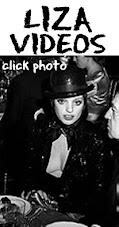


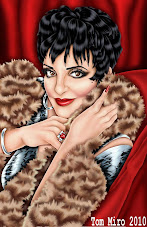

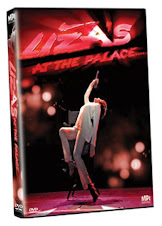











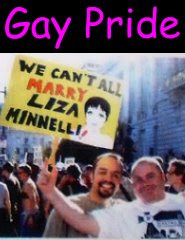










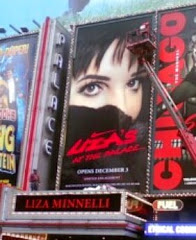




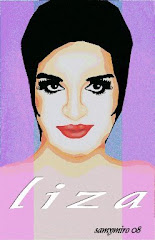


























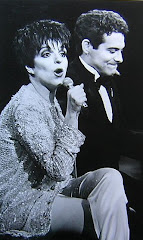


































No comments:
Post a Comment